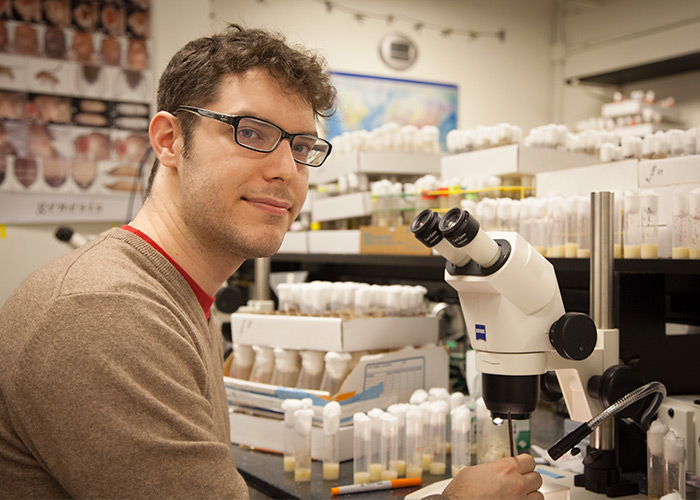The Blood-Brain Barrier: Controlling Behavior
Graduate Student Cameron Love Studying Role of Dopamine Receptors
“I am interested in how behavior, which is controlled by the central nervous system, can be affected by proteins that are formed in the rest of the body,” said Cameron Love, a Ph.D. student in the Department of Biology and Biochemistry at the University of Houston. “These proteins have to contend with the blood-brain barrier, the main function of which is to control what goes in and out of the brain.”
 Cameron Love, Ph.D. student in biology and biochemistry, is studying the genetic basis
of behavior in Drosophila.To do this, Love is studying the fruit fly Drosophila melanogaster. His research is conducted in the lab of Brigitte Dauwalder, associate professor
of biology and biochemistry in the College of Natural Sciences and Mathematics.
Cameron Love, Ph.D. student in biology and biochemistry, is studying the genetic basis
of behavior in Drosophila.To do this, Love is studying the fruit fly Drosophila melanogaster. His research is conducted in the lab of Brigitte Dauwalder, associate professor
of biology and biochemistry in the College of Natural Sciences and Mathematics.
Love is studying the role of a specific dopamine receptor found in the blood-brain barrier. When this receptor’s activity is reduced in the blood-brain barrier of male flies, courtship behavior decreases.
In humans, dopamine receptors interact with the neurotransmitter dopamine. Dopamine receptors are thought to be involved in proper functioning of the brain, while abnormal dopamine receptor activity is thought to play a role in various psychiatric disorders. Given that human dopamine receptors are similar to the ones found in flies, any insights about how this protein functions is likely to be applicable to humans.
Courtship behavior in male flies is highly specific and specialized, with male flies going through a highly scripted set of movements. What this means is that behavioral biologists, such as Love, can quantify this behavior.
Love’s current research is focused on understanding what role this dopamine receptor plays in the blood-brain barrier, and how that leads to changes in behavior. Going forward, Love will utilize genetic tools to test the different functions of this dopamine receptor in Drosophila.
“We know that dopamine receptors play a role in neurons, but we’ve never studied their role in glial cells, which make up the blood-brain barrier in Drosophila,” Love said.
Love, who matriculated into the graduate program at University of Houston in 2013, plans to stay in academia after graduation.
- Rachel Fairbank, College of Natural Sciences and Mathematics
January 3, 2017